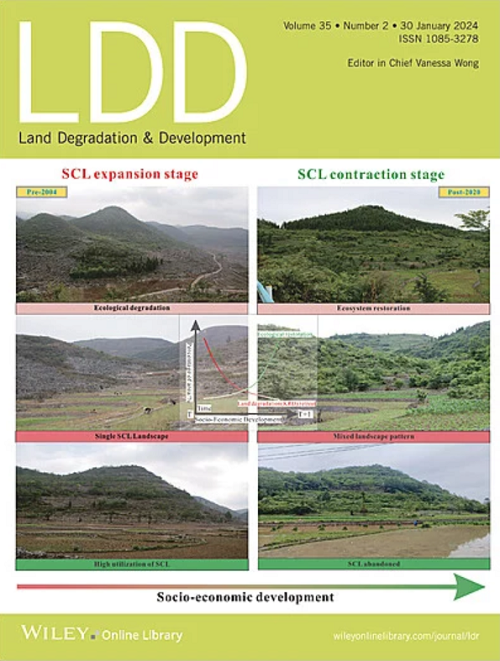From Agricultural and Forest Land Development to Urban Landscapes: Green Energy's Influence on Global Pollutant Emissions
IF 3.6
2区 农林科学
Q2 ENVIRONMENTAL SCIENCES
引用次数: 0
Abstract
There is a sharp inclination to use green energy sources such as solar, hydro, and nuclear energy to accomplish the COP29 targets and sustainability goals. The current study attempts to explore the role of green solar, hydro, and agriculture land use apropos global pollutant emissions. In doing so, the study examines the impacts of agricultural land use, forest area, and urbanization on global emissions. The study uses the global historical data from 1990Q1 to 2021Q4. The authors employ the diagnostic tests, autoregressive distributed lag models, and causality analysis for empirical analysis. The autoregressive distributed lag model's results mentioned that agricultural land and forestry also help improve environmental sustainability and urban landscape in the short and long run. In addition, the results find linear and nonlinear impacts of green solar and nuclear energy to mitigate the global carbon emission levels. The structural change policies of industrialization and urbanization remain the critical obstacles to attaining environmental sustainability. The on-hand research contributes to the ongoing challenges faced by global economies regarding green energy sources, agriculture land management and their criticality in attaining a sustainable environment by reducing carbon emissions. The research recommends further investments in green solar, agriculture land management, and incentivizing clean energy sources to achieve sustainable global development.从农林用地开发到城市景观:绿色能源对全球污染物排放的影响
利用太阳能、水电和核能等绿色能源来实现COP29目标和可持续发展目标的趋势非常明显。目前的研究试图探讨绿色太阳能、水电和农业用地对全球污染物排放的影响。在此过程中,该研究考察了农业用地、森林面积和城市化对全球排放的影响。该研究使用了1990年第一季度至2021Q4年的全球历史数据。作者采用诊断检验、自回归分布滞后模型和因果关系分析进行实证分析。自回归分布滞后模型的结果表明,农用地和林业在短期和长期都有助于改善环境可持续性和城市景观。此外,研究结果还发现绿色太阳能和核能对全球碳排放水平的线性和非线性影响。工业化和城市化的结构改革政策仍然是实现环境可持续性的关键障碍。手头的研究有助于全球经济在绿色能源、农业土地管理及其通过减少碳排放实现可持续环境方面面临的持续挑战。该研究建议进一步投资绿色太阳能、农业用地管理和鼓励清洁能源,以实现可持续的全球发展。
本文章由计算机程序翻译,如有差异,请以英文原文为准。
求助全文
约1分钟内获得全文
求助全文
来源期刊

Land Degradation & Development
农林科学-环境科学
CiteScore
7.70
自引率
8.50%
发文量
379
审稿时长
5.5 months
期刊介绍:
Land Degradation & Development is an international journal which seeks to promote rational study of the recognition, monitoring, control and rehabilitation of degradation in terrestrial environments. The journal focuses on:
- what land degradation is;
- what causes land degradation;
- the impacts of land degradation
- the scale of land degradation;
- the history, current status or future trends of land degradation;
- avoidance, mitigation and control of land degradation;
- remedial actions to rehabilitate or restore degraded land;
- sustainable land management.
 求助内容:
求助内容: 应助结果提醒方式:
应助结果提醒方式:


